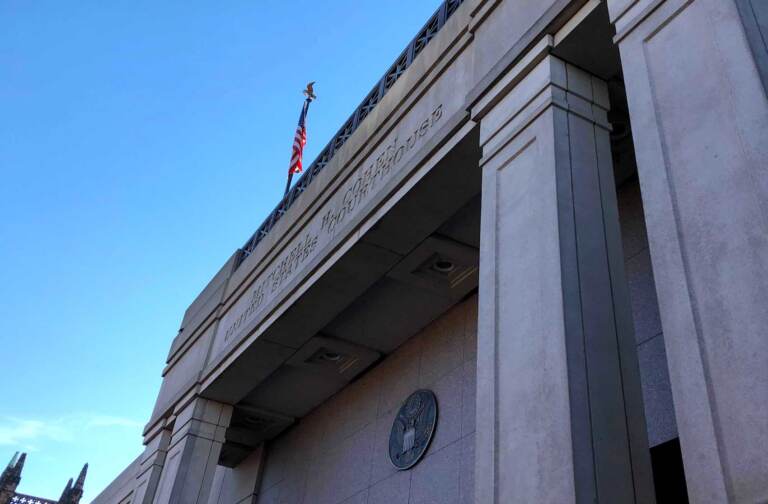N.J. courts make changes to jury selection process; advocates push lawmakers to do more
New Jersey Supreme Court said the changes will make jury selection more equitable and expand the pool of eligible jurors.

The Camden Federal Courthouse in New Jersey (P. Kenneth Burns/WHYY)
The New Jersey Supreme Court has adopted a slew of changes it says will make jury selection more equitable, while “enhancing fairness” in the process.
Changes include using state labor records to generate jury lists, instead of relying primarily on voter information; including questions about a potential juror’s gender, race, and ethnicity in qualification questionnaires; and requiring implicit bias training for potential jurors, judges, and court staff.
The revisions came weeks before state courts reconvene from summer recess on Sept. 1.
Additionally, the Supreme Court has recommended that state lawmakers pass legislation that increases juror compensation and allows people convicted of certain crimes to serve on a jury.
Why did N.J.’s Supreme Court undertake jury reform?
The New Jersey court system committed to jury reform following a unanimous Supreme Court decision in State v. Andujar last summer, which found that Edwin Andujar, an Essex County resident, was not given a fair trial due to bias in the jury selection process.
Prosecutors executed a criminal background check on the lone Black juror in Andujar’s 2017 murder trial after the juror voluntarily stated during the selection process that they knew people who had been accused of crimes, that they knew people who worked in law enforcement, and several people who had been crime victims.
Subsequently, prosecutors arranged to have the juror arrested the very next day after it found an open municipal warrant for the juror.
After the Supreme Court ruled in Andujar’s favor, it launched the Committee of the Judicial Conference on Jury Selection to “examine New Jersey’s jury selection processes and recommend improvements designed to broaden participation and representativeness and reduce the effects of purposeful discrimination and all types of bias,” the court said.
The committee, which was chaired by Chief Justice Stuart Rabner, consisted of representatives from different branches of the state government, legal stakeholders, and community members.
They met virtually and in person from November 2021 until last April, to discuss the changes.
What are some of the new rules?
By utilizing state labor records to fill jury lists, the state would expand the number of people who are eligible to serve on a jury.
Currently, New Jersey uses voter registration, driver’s license information, tax returns, and other tax forms to make up jury lists.
The Supreme Court looked to extend potential jury lists by including people receiving public assistance, according to NJ Spotlight News.
It also approved a pilot program for attorney-conducted voir dire, or ACVD, instead of a judge-led procedure. ACVD is the process of questioning potential jurors ahead of a trial.
During the conference, advocates argued that “greater attorney involvement supports more targeted questioning that leads to the discovery of relevant information about jurors,” according to a Supreme Court statement.
“With enhanced information, attorneys can raise informed challenges for cause based on individual reasons why a juror may be unable to be fair in a particular case, thereby avoiding reliance on a gut feeling, hunch, or group bias. The proper dismissal of jurors for cause, in turn, facilitates a fairer and more equitable process of jury selection.”
What laws need to change?
The committee suggested that jurors be paid more (jurors are currently paid $5 per day for the first three days of trial) and that people convicted of certain crimes be allowed to serve as jurors.
State lawmakers would have to pass laws to make these changes.
In January, Assemblywoman Verlina Reynolds-Jackson (D-Mercer) reintroduced legislation that would allow people with past convictions to serve jury duty.
The measure has not yet received a legislative committee hearing, though she said the judiciary’s recommendation may improve support for her bill.
“I think when we talk about restorative justice, this is one of those big topics that has been overlooked,” Reynolds-Jackson said. “I feel like we have some credibility behind it. Maybe now, this is what we need for leadership to be able to move it forward, to get to a hearing.”
In 2019, Gov. Phil Murphy signed a law that restored the right to vote to more than 80,000 people on probation or parole.
“Normally you wouldn’t get picked for jury duty because you weren’t a registered voter. Well, now we’ve just restored thousands of people’s rights to vote. And so now we should be able to also increase the jury pool. Jury duty isn’t one of those glamorous jobs, but it is a public service that we must all participate in,” Reynolds-Jackson said.
Henal Patel, leader of democracy and social justice programming at the New Jersey Institute for Social Justice, served on the committee and called it a “great experience.”
Patel said that many of the approvals, including the recommendation to allow people convicted of certain crimes to serve on jury duty, would largely impact people of color.
“A lot of this started with Ferguson,” Patel said, referring to a 2014 case in which a Missouri grand jury declined to indict a police officer who killed an unarmed Black man named Michael Brown. “There’s a growing understanding among people that our criminal justice system is … flawed, but in reality, broken, that there are a number of issues here — systemic issues, systematic issues. Jury service is an important part of helping to address it. This is something that you and I and every person here actually participate in.”
How will these changes address underrepresentation?
A 2021 Equal Justice Initiative report found that Black people are disproportionately underrepresented in jury pools nationwide.
State courts will now ask potential jurors three new questions, about their gender, race, and ethnicity during qualification questionnaires, to better assess jury demographic makeup.
Additionally, courts will include demographic information on trial jury lists and provide an annual data report
“Our incarcerated population is 61%, Black, in a state that’s about 15% Black,” Patel said. “We have the worst racial disparity and adult incarceration in the country. All of this gets wrapped up … and it’s tied to the jury service pool.”
Overall, the Committee of the Judicial Conference on Jury Selection approved more than two dozen recommendations in July.
WHYY is your source for fact-based, in-depth journalism and information. As a nonprofit organization, we rely on financial support from readers like you. Please give today.







